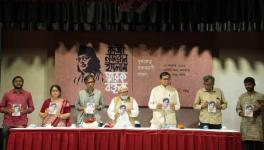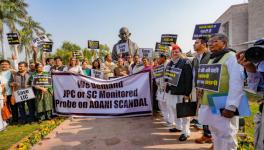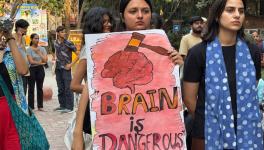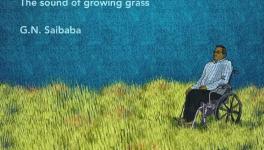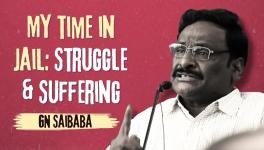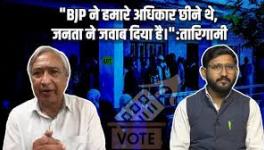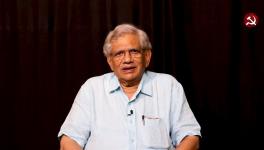A MOSAIC FASCISM - Terrorist Acts will Increase if Laws to Suppress them are Abused
At the suggestion of Subhashini Ali I recently visited Faizabad in Uttar Pradesh to speak along with her at a public seminar.
As we drove from Kanpur to Faizabad, two Muslim youths, Wasif and Mumtaz, who are known to her, took a lift in our car up to Lucknow, and sat next to me on the back seat. Wasif had spent eight years as an under trial prisoner, part of it under solitary confinement, charged with terrorist acts under the Unlawful Activities (Prevention) Act, before being acquitted by the court. Mumtaz, similarly charged, had spent nine years in jail before being acquitted. And neither of them had managed to get any employment after being acquitted.
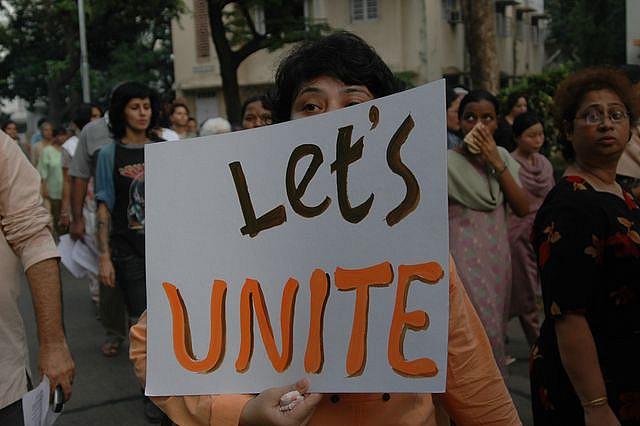
Image Courtesy: flickr.com
Their stories are typical of hundreds of young Muslim men in UP and elsewhere in the country who spend years in jail in spite of being perfectly innocent; and even at the end of that ordeal, even when their innocence has been upheld by the court and they are released from prison, they get no compensation or employment from the State, and are usually unable to obtain any employment on their own, owing to the stigma of having been charged with ‘terrorism’.
I am willing to accept that many among the under trial prisoners rotting in jails for years may indeed be guilty of aiding and abetting terrorism. I am willing to concede too that in any fight against terrorism some innocents may get hurt, as what the Americans call “collateral damage”. But a democracy must make every effort to avoid such “collateral damage”. For this it is necessary, first, that law itself must be so framed that nobody is held without trial for any length of time, and, second, that the basic principle of a humane jurisprudence that a person is innocent until proven guilty is adhered to. In our so-called “fight against terrorism”, both these principles, alas, have been given a go-by.

Image Courtesy: flickr.com
The Unlawful Activities (Prevention) Act, a successor to the Terrorist and Disruptive Activities (Prevention) Act and the Prevention of Terrorism Act, is a draconian legislation under which those accused of ‘terrorist crimes’ can be held for years in detention. Courts are unwilling to grant bail even to those against whom there is little evidence, because terrorism, they believe, is such a ‘heinous crime’ that anyone, who is even merely accused of it, forfeits ipso facto any right to bail.
Likewise the idea of ‘innocent until proven guilty’ is so foreign even to our legal minds that several bar associations in UP, notably Faizabad, Varanasi, Lucknow and Barabanki, have passed resolutions barring their members from defending persons accused of ‘terrorism’. Those with the temerity to flout such bans are invariably threatened, socially boycotted, dubbed ‘anti-national’ and severely beaten up. Almost inevitably the only lawyers willing to risk defending a person accused of ‘terrorism’ are drawn from among the co-religionists of the accused, since they share some sense of solidarity with him. They too, however, are not spared the wrath of the so-called ‘patriots’. On the contrary, the fact of their taking up the legal defence of the accused only confirms the ‘patriots’ in their opinion that all persons professing that religious faith are in cahoots with the ‘terrorists’.
Indeed the occasion for the public seminar in Faizabad for which Subhashini Ali and I had gone had been provided by the death under mysterious circumstances, in police custody, of one such undertrial prisoner who had been incarcerated for the last six years. The lawyer defending him, who was his co-religionist and had flouted such a ban, had been so severely beaten up by some fellow ‘lawyers’ that he was still in hospital during our visit.
In short, in UP and elsewhere in India today the conditions are such that literally any innocent person can be picked up by the police under the UAPA for being a ‘terrorist’, tortured, and kept in jail for years as an undertrial prisoner (with bouts of solitary confinement) with scarce access to legal defence. If he is lucky enough to survive until the verdict is given, his chances of being set free are small, no matter how slender the evidence against him, because a ‘confession’ would quite possibly have been wrung out of him in the interim, and also because his legal defence would have been weak anyway. And if perchance he is set free, he remains unemployed for the rest of his life, having already spent the best years of his life in jail.
What this constitutes is a veritable assault on democracy in the name of ‘fighting terrorism’. But it is not just undemocratic and inhumane; it is also counter-productive against terrorism. Even an innocent person who has experienced such degradation and suffering, and who finds life intolerable in spite of being set free, will be strongly tempted to join the ranks of the ‘terrorists’: they at least can offer him a livelihood, and their propaganda about the hollowness of Indian democracy and secularism would appear to the victim as being valid in retrospect. What is more, even if the victim does not become a terrorist ex post facto, the terrorism of the State would have permeated the system, meanwhile, as a cancerous affliction. Either way therefore the ‘fight against terrorism’ would have been lost.
Teesta Setalvad draws a contrast between the case of Mohamed Haneef, who originally came from Bangalore but was a medical doctor in Australia, and was picked up by the Australian police for abetting ‘terrorism’, and cases of numerous Muslim undertrial prisoners in India. Haneef was picked up because his mobile phone SIM card — which he had given to his cousin Sabeel Ahmed, the main accused in the failed Glasgow Airport bombing case — was linked to the attack. The Australian police kept him in custody for 12 days, the longest apparently in recent Australian history, and then released him as innocent. The Australian State offered him an apology and an unspecified amount of compensation. In India by contrast, Wasif Haider, one of my co-passengers from Kanpur to Lucknow whom I mentioned earlier and who spent eight years in jail, not only has got no compensation, but is even today vilified as “terrorist Wasif”.
A Communist Party of India (Marxist) delegation recently met the president, Pranab Mukherjee, on this issue with three simple demands: special fast-track courts to ensure that all such cases are settled within a year; prosecution of policemen who fake evidence against innocent persons, and payment of compensation to the victims, together with their rehabilitation, including the provision of employment if necessary. What Mukherjee does about these demands remains to be seen, but, even if some assurances are given by the State, translating them into reality will require sustained struggle.
This is not a struggle for ‘Muslims’ alone, or a struggle against the communal forces alone. Of course the ‘Muslims’ today are the main victims; and the communal forces today, at whose behest the bar associations in UP refuse to take up the legal defence of those accused of ‘terrorism’, are the main standard-bearers of this bizarre version of ‘patriotism’. But the struggle is really between a humane democracy and an authoritarian-fascist State. It is between a State where everyone, irrespective of caste or religion, enjoys certain rights, and thereby claims membership of a community of equals in a terrain that transcends the empirical one of religion, caste, or ethnicity to which he or she may have belonged, and a regime of communal-fascism where in the name of a religious community we have an abrogation of rights and freedoms, not just of persons of other religious communities, but of all who oppose such a regime. What is happening to Muslims in UP and elsewhere today is part of a process of descent into fascism.
The diversity of India, however, comes into play here. The social historian, Ravinder Kumar, used to say that in Indian history even when there was a peasant revolt in one village, the neighbouring village was often unaware of it. Fascism, too, comes here not as one spectacular imposition, but as part of a ‘mosaic reality’. While innocent Muslim youths in UP are picked up by the police and kept for years in jail with impunity, the intelligentsia in Delhi is unlikely even to be aware of it, let alone give it any credence, not having faced any similar abrogation of its own rights and freedoms.
Fascism however will not remain part of a ‘mosaic’ reality for long. The conditions that perpetuated the kind of fragmented isolation that Ravinder Kumar had talked about for an earlier period, no longer exist today. Before ‘mosaic fascism’ becomes full-fledged fascism that both invokes and, paradoxically, intensifies the ‘terrorist’ threat to sabotage our tryst with democracy, progressive opinion in the country must take note of what is going on.
Disclaimer: The views expressed here are the author's personal views, and do not necessarily represent the views of Newsclick
The author is Professor Emeritus, Centre for Economic Studies, Jawaharlal Nehru University, New Delhi
Get the latest reports & analysis with people's perspective on Protests, movements & deep analytical videos, discussions of the current affairs in your Telegram app. Subscribe to NewsClick's Telegram channel & get Real-Time updates on stories, as they get published on our website.









